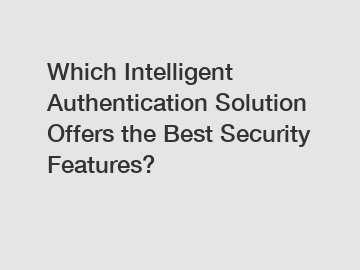Which Intelligent Authentication Solution Offers the Best Security Features?
Which Intelligent Authentication SolutionIntelligent Authentication Solution Offers the Best Security Features?
In an increasingly digitized world, the need for robust authentication solutions has become paramount. As organizations prioritize data security and user privacy, selecting an intelligent authentication solution with top-notch security features is crucial. In this article, we will explore various authentication solutions and analyze which one provides the best security features.
Biometric Authentication: Ensuring User Identity with Unique Characteristics.

Biometric authentication leverages an individual's unique physical or behavioral traits such as fingerprints, iris patterns, or voice recognition for verification. This advanced technology offers a high level of security by ensuring that only authorized individuals gain access. By employing biometric factors, organizations can eliminate the vulnerabilities associated with passwords or PINs.
One significant advantage of biometric authentication is its resistance to fraud. Biometric traits are often challenging to replicate, making it extremely difficult for fraudsters to bypass the system. The implementation of liveness detection in certain biometric solutions also prevents the use of spoofing techniques, such as using photographs or fake fingerprints.
However, biometric authentication systems must navigate potential privacy concerns. Organizations need to handle biometric data with utmost care, following strict privacy laws and protocols. Additionally, there is always the possibility of biometric data breaches, which could have severe consequences. Therefore, selecting a biometric authentication solution that adheres to top-notch security measures becomes crucial.
Multifactor Authentication: Bolstering Security with Layered Verification.
Multifactor authentication (MFA) is a security practice that requires users to provide two or more verification factors in order to access a system or application. By combining different factors such as something users know (passwords), something they have (smartphones), and something they are (biometrics), MFA adds an additional layer of security.
One of the key advantages of MFA is its ability to mitigate risks associated with stolen or weak passwords. Even if an attacker manages to obtain a user's password, they still lack the other required factors to gain access. Additionally, MFA provides organizations with greater control over data access by allowing them to require different factors for different levels of authentication.
While MFA significantly enhances security, it may also introduce user inconvenience. Users might find it burdensome to provide multiple factors, particularly if they are in a rush or have limited access to certain authentication factors. Organizations must strike a balance between usability and security when implementing MFA solutions.
Blockchain-based Authentication: Decentralized Security and Transparency.
Blockchain technology, most commonly associated with cryptocurrencies, has also found application in the field of authentication. Blockchain-based authentication offers decentralized security, ensuring that authentication data is distributed across multiple nodes rather than being concentrated in a single server. This decentralization makes it exceedingly difficult for malicious actors to compromise the system.
The transparency offered by blockchain technology is another advantage. Every transaction within a blockchain is recorded, making it easier to identify any unauthorized changes or attempts to access data. This ensures accountability and facilitates audits, strengthening overall security.
However, blockchain technology is still in its early stages of adoption in authentication systems. While it provides an innovative approach to security, there may still be vulnerabilities that have yet to be discovered or addressed. Organizations need to carefully evaluate the maturity and effectiveness of blockchain-based authentication solutions before implementation.
Closing:
In conclusion, the selection of an intelligent authentication solution with robust security features is a critical decision for organizations. While biometric authentication offers unique characteristics for individual identification, MFA provides layered verification to enhance security. On the other hand, blockchain-based authentication offers decentralized security and transparency. By thoroughly evaluating the specific needs and risks faced by their organization, businesses can determine which solution offers the best security features. For more information on intelligent authentication solutions, contact us today.
Keywords: contact us.
If you want to learn more, please visit our website Itniotech - Verification SMS, Voice Batch Notification Service.


